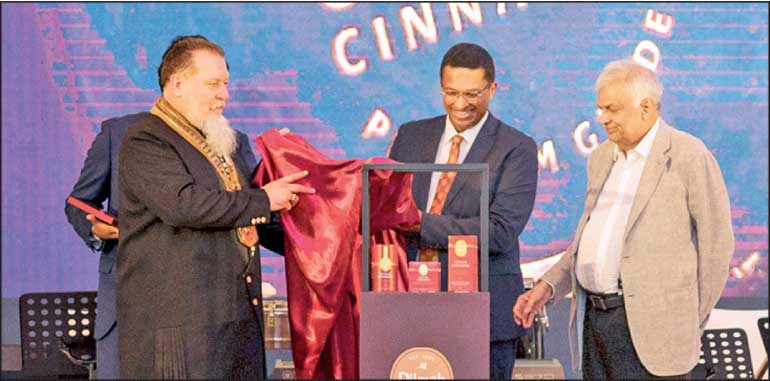Tuesday Mar 03, 2026
Tuesday Mar 03, 2026
Tuesday, 30 April 2024 00:42 - - {{hitsCtrl.values.hits}}

President Ranil Wickremesinghe and World Chefs President Thomas Gugler unveil the Dilmah Ceylon Cinnamon offering at its launch at the Galle Face Hotel in Colombo, Dilmah Chairman Dilhan Fernando looks on
President Ranil Wickremesinghe on Sunday hailed Dilmah for giving a new beginning for Ceylon Cinnamon as one of Sri Lanka’s iconic tea brands made a strategic diversification to add value and market perhaps the country’s best of spices with far reaching health benefits and a culinary wonder.
Dilmah is launching what it calls the finest Ceylon cinnamon of premium grade sourced from its plantations in Kahawatte to global and local markets. President Wickremesinghe was the Chief Guest at the launch titled “The renaissance of finest Ceylon Cinnamon.”
The launch at the iconic Galle Face Hotel also saw the presence of World Chefs President Thomas Gugler whilst the multiple-course sit down dinner saw a feast of cinnamon infused gastronomy and music. Cuisine and beverage were curated by Australian Masterchef Dulan Hapuarachchi joining former Gordon Ramsay Italy Chef Ruki of the Galle Face Hotel.
“Sri Lankan cinnamon is still the best in the world. And thank you, Dilmah, for resurrecting the name “Ceylon Cinnamon”, just as you have resurrected the name “Ceylon Tea.” This is the beginning of another chapter in cinnamon, which will see it coming back to its glory. Thanks to Dilmah and whatever support you need, we are here to give it to you. So all the best to Dilmah and to all of you,” President Wickremesinghe told the launch attended by diplomats, business leaders and food enthusiasts.
Dilmah described cinnamon as one of the most extraordinary gifts of nature produced by artisans in Sri Lanka. According to Dilmah Chairman Dilhan Fernando, Ceylon Cinnamon is scientifically proven to be unique, since 1000 BC sought after and fought over for the extraordinary sensorial, culinary and human health benefits that genuine Ceylon Cinnamon offers.
Handpicked and made in the traditional artisanal manner that has been perfected over millennia, Dilmah is offering genuine Cinnamon in Pure powdered form, Continental Grade Quills, spice mix seasoning as well as cinnamon infused tea.
“This is the evolution of a decade long commitment which was initiated by my late father Merrill J. Fernando, to develop our cinnamon gardens on Kahawatte Plantations sustainably and ethically, collaborate with scientists in understanding and perfecting the artisanal method of peeling and drying Ceylon cinnamon with respect to nature and tradition,” Dilhan said. “In parallel we have built quality infrastructure with state-of-the-art low temperature sterilisation and milling to ensure that our Ceylon cinnamon delivers safety and purity in addition to the promise of taste and goodness,” he added.
In his address, President Wickremesinghe said the Government has decided to modernise agriculture as a key strategy for economic transformation.
“From the time of the Sinhala kings until the British left us in 1948, agriculture was our mainstay. I am not saying to do away with others; all that is essential. But we forgot about agriculture. So the whole plan for modernisation is being discussed. New legislation is being brought in. But it has to be a beneficiary-centric process in which the Government and the private sector join together,” the President said.
In his address Wickremesinghe also made the following observations.
“What you don’t realise is that cinnamon is a part of our history. When the Polonnaruwa kingdom collapsed and we moved into the Southwest wet zone, the only thing that kept the economy going was cinnamon. If we had no cinnamon, we wouldn’t have had the kingdoms of Dambadeniya or Yapahuwa or Gampola or Raigama or Kotte. That’s how closely tied cinnamon is to our history.
The ruler of Jaffna was luckier. He had elephants and pearls. But he got ambitious. He got greedy. He thought that he should also get a share of the cinnamon. So he came, he conquered, he captured Puttalam, got the rulers to pay tribute, but he said that wasn’t enough, he must control the trade. So he decided to come and take over Raigama and Kotte. The Kerala merchants who controlled the trade thought we can’t let him go any further. So they got Alakeshwara, the top man in their number, to build a fort and defeat Arya Chakrawarthi. So that’s another part of our history.
Why did Parakramabahu VI take over the Kandyan kingdom? Because then he could control all the cinnamon. And the splendour of that kingdom is depicted in the “Sela Lihini Sandeshaya”. Take the example of Rajasinghe of Sitawaka who fought the Portuguese. He confined them to the forts of Colombo and Negombo. He took over all the cinnamon that was collected in his kingdom and the areas under Kotte. Then he took all the cinnamon and burnt all the low-quality cinnamon, leaving only the high-quality ones. I don’t know whether Dilmah has been paying copyrights or royalties to his descendants. So this is how much cinnamon is tied up with our kingdoms. And that provided the money for the Kandyan kingdom to exist. But as cinnamon gave way to coffee and tea, when the price of cinnamon came down, the whole situation changed. But now we see that Sri Lankan cinnamon is still the best in the world.”